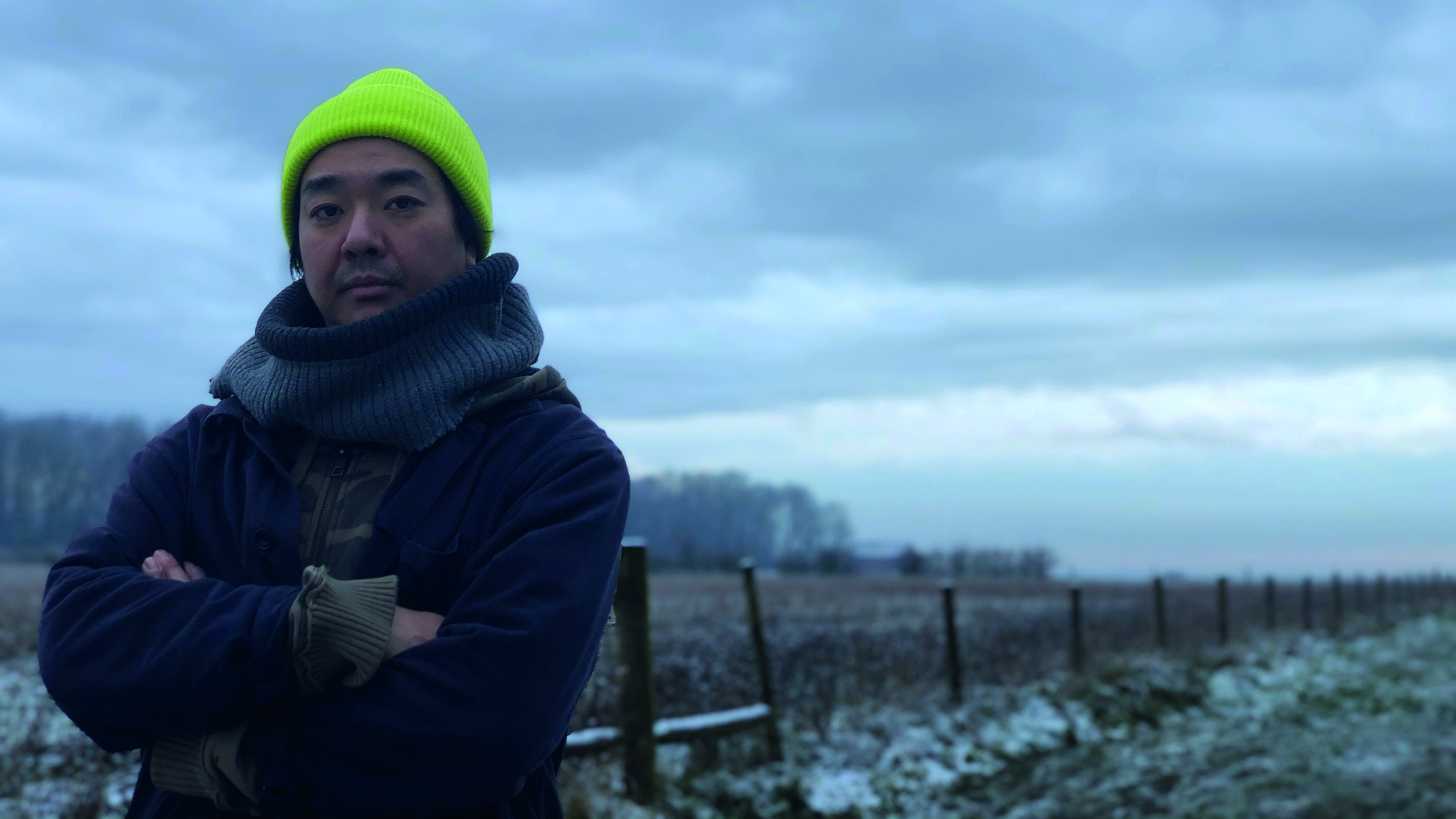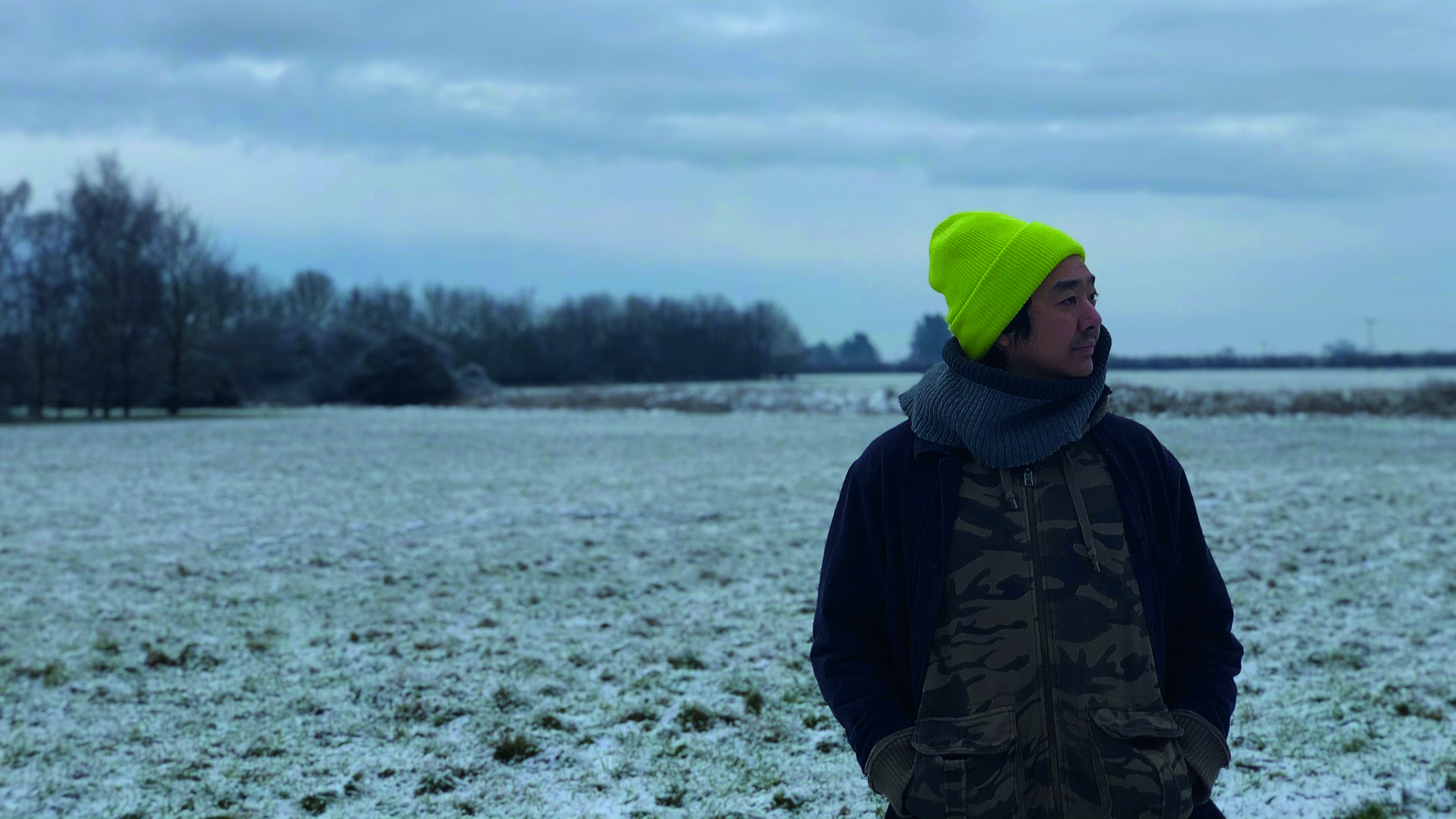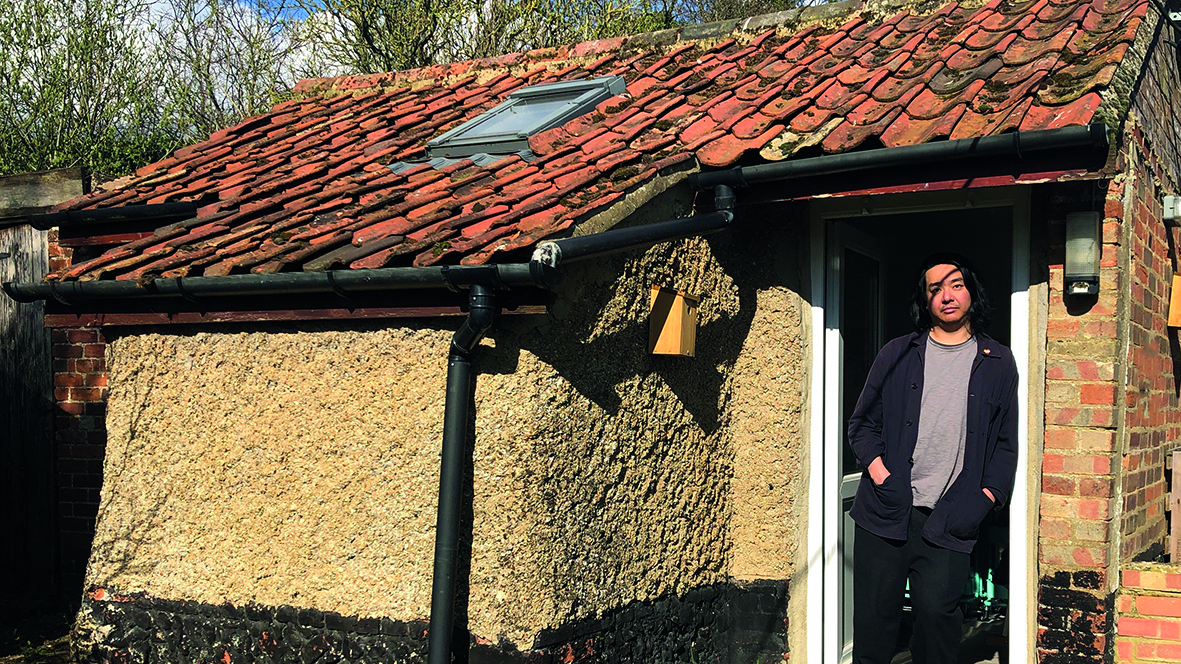Andrew Hung: "I didn’t realise how much technique was involved in singing - I thought it was just like talking"
Left dissatisfied by his debut solo debut album Realisationship, Andrew Hung felt the need to brush up on his craft and break through some mental barriers. We discuss the follow-up, Devastations

Andrew Hung, best known for being one half of electronic music duo Fuck Buttons, is very much in demand.
Despite the project being on hold since 2013, he’s subsequently recorded a track with Jean-Michel Jarre, co-produced for Beth Orton and Aimee Osbourne (daughter of Ozzie), and written the soundtrack to cult director Jim Hosking’s comedy horror, The Greasy Strangler.
Hung’s second solo electronic album, Devastations, documents a transitional period in his career.
Striving to perfect the one-man-band approach of its predecessor, Realisationship - a body of work he’s only recently come to appreciate - despite being recorded almost entirely digitally, its propulsive beats, angular instrumentation and stark, yearning vocals are a disarming throwback to ’80s new wave songcraft...

Was Devastations recorded pre-pandemic or did the isolation give you the perfect opportunity to work on a second solo album?
“I’m not sure how to compartmentalise the process now but it was definitely finished during the pandemic. Most of it was written before, but when it came to mixing it took or four or five attempts to cross the line due to whatever mental barrier I was experiencing.
"I guess going through all those mixing processes gave it a degree of re-polishing - it certainly gave me the opportunity to inspect my working processes because I’m always looking for ways to be as efficient as possible.”
Get the MusicRadar Newsletter
Want all the hottest music and gear news, reviews, deals, features and more, direct to your inbox? Sign up here.
How do you feel Devastations builds on the your debut solo album Realisationship?
“I heard Realisationship again recently, but it’s only now I actually think it’s a good album. It was my first solo record and my initial expectation was ‘I can do this’ - and I did, but at the time I felt like I’d let myself down and it could have been better, so I went a bit militant and focused on improving pretty much everything.
"Nothing really changed in terms of the artistry, but I focused a lot more on the craft of making an album. With Devastations I feel I’ve brought out more of what I wanted but couldn’t.”
You appear to be quite self-critical. Does a point arrive when you have to finish a record, warts and all?
“At the time, I’d put that lack of satisfaction I mentioned down to my craft. I looked for a depth I couldn’t quite define and went on this journey to uncover that. I started to wonder if my dissatisfaction was down to the lack of value I placed in myself and started excavating my mind to discover why that occurs.
"As a result, I’m more comfortable with it, which explains why I can hear Realisationship for what it is rather than what I wanted it to be. The reason I struggled to mix Devastations was also due to me wanting it to be something rather than judging it for what it was.”
It seems to be influenced by a post-punk/new wave sound. Was that deliberate or more down to your lo-fi-sounding production process?
“I like the idea of punk in that it gives you permission to do whatever you want. For me, it was less about an aesthetic and more to do with having that freedom.
"In that respect, I do find there’s a connection, but I’ve been hearing quite a few interesting interpretations of the album lately. A lot of people say it sounds like Jarvis Cocker. ”
We were thinking more Joy Division…
“Joy Division for sure, but as I mentioned there’s been quite a few comparisons to Pulp. I guess I’m flattered by that - it’s nice to be compared to icons isn’t it?”
You mentioned that you found it difficult to find the confidence to sing on your own recordings. Are you more comfortable with that now?
“I’ve had to focus quite a bit on the vocals. I didn’t realise how much technique was involved in singing - I thought it was just like talking [laughs]. I’m pleased with my voice now, but I did attend an intensive vocal course so I’ve been taught quite a lot over the past three or four years.
There have been been quite a few comparisons to Pulp. I guess I’m flattered by that - it’s nice to be compared to icons isn’t it?
"One is tempted to believe that preparation removes the magic of a vocalist, but my experience is that the lessons allowed me to reveal what I wanted to come out. My teacher told me that the magic only happens when art and craft meet.”
You have a very passionate and expressive vocal, so it’s hard to envision anyone else performing your songs…
“The reason I didn’t use guest vocalists on the first album was more out of laziness - I couldn’t be bothered to organise it. It would be so much easier to make instrumental music, but there’s something about vocals that enables you to have an emotional directness to your audience and that’s really what I’m interested in now.
"Hearing your voice loud in a room is an extraordinary and overwhelming feeling - it felt so different to anything I’d done before and has been incredibly valuable for that reason.”
The vocals, and the music, seem to have an underlying tension. What subject matters are you detailing?
“Personally, the album was about going through an ending of sorts and the tension is about breaking through the last part of that into a new world.
"The first track is called Battle and the second Promises, but with the third, Brother, I felt myself coming into a clearing - a push to move away from the pull of an old habit.”
As an established artist but a relative newbie to vocals and lyric-writing, what tips would you give for people who want to explore that side of the musical coin?
“I’d recommend they get a condenser mic because they’re quite cheap. The first one I bought was a RØDE NT1-A and I like how you can sing directly into it without having to do a lot of processing yet it still sounds good.
"I like writing lots of ideas - mostly they’re just repetitive patterns, but if they make me feel anything, I find they’re worth pursuing.”
You performed all of the instruments on the album, including drums. Is that also something you’ve taught yourself?
“On Realisationship I couldn’t play drums for a full song; I’d just play eight bars of a track and get a live drummer in. This time, the distinction between demoing and production is not as clear cut because the drums on Devastations are all VSTs.
"I use XLN Audio’s Addictive Drums and love the sound of it. When I first used them I wasn’t getting the depth that I wanted and wondered whether it was to do with the ambient sound around the drums, but I’ve got them sounding really good now.
"I’m basically just playing the drums on a keyboard and then adding a few delay throws to add a little extra detail and variety. I also added quite a lot of saturation to make them sound big. I don’t like to over-edit though, because I want the drums to have a sense of propulsion.”

Space has quite a proggy sound, and we like how you use spacey sounds to embellish the track. What were you using on that one?
“The bassline was taken from a well-known dancehall rhythm sound from the Casio MT40 keyboard, and I recorded that with some lo-fi bass notes that I later replaced with VSTs.
"With this album I wanted to reintroduce an element of noise and that’s probably what gives the track its spacey feel. I’ve always been a fan of Native Instruments Massive for that.
"The arpeggio synth sound came from Arturia’s Analog Lab. I’ve always loved organ sounds as they’ve got quite an emotional depth, and I’ve started using a VST version of the Korg MS-20, which has a lovely harsh, piercing sound.”
To the untrained ear, Devastations sounds like a band, yet most of it has evidently been made in the box. Is that testament to how sophisticated software has become?
“A few decades ago, the live instruments would have been recorded first and the electronic elements added, but this process was the complete opposite. The guitars were the last thing to be recorded along with the final vocals.
"Guitars are quite difficult to replicate in a VST but I used Guitar Rig, so I’d attribute most of the guitars to VSTs too, although I did use a preamp as a digital interface.”
You mentioned focusing on improving your mixing technique. What specific areas have you concentrated on?
“For the mix, I like to begin by having quite a basic recording process. If I want to make sure a song’s alright I’ll write it on a piano and if I want to make sure the beats are OK, I’ll listen to them on their own, so I like stripping stuff down to their bare essentials and making them sound good before adding any effects.
The best technique for mixing is to have a good arrangement.
"The best technique for mixing is to have a good arrangement and if there’s too much going on in one frequency range I’ll just bump stuff up to the top where there’s more space.
"For me, reverb is an afterthought that I use to glue everything together. I’ll use the FabFilter reverb if I want things to sound a little classy on strings or guitar, and for vocals I used iZotope Nectar, because that’s really easy to work with.”
Did you learn a lot about mixing and production from the sadly departed Andrew Weatherall?
“I’d never been in a studio before meeting Andrew so I learnt what was possible from him. I still think about that time - things just pop up.
'He taught me to maintain integrity in my artistry, and that it doesn’t matter how good you are technically, there’s something you have to get to the heart of. He didn’t touch the keyboard or the computer - it was about how anyone in that room, regardless of what they were doing, was affecting the sound. He was a massive presence, which was perplexing at the time but powerful.
'What’s got to be drummed into producers is that it’s very easy to focus on things that aren’t really important. I experienced that with Andrew and Beth Orton. They ooze an experience that you can’t really put into words - you just know that they know.”
But with Beth you were producing for her…
“She’s a massive hero of mine so I just produced her in a way that would get the best out her, which was really all about getting Beth to play. Encouragement and support are really important and she said at the time that no one had just given her a keyboard to play with.”
What with Devastations being recorded using mostly digital tools, you presumably have quite a streamlined studio setup?
“It’s a little old outbuilding at the back of the garden and quite basic. Because lockdown’s been quite sedentary I’ve tried to create a standing up area, so that’s my exercise [laughs].
"I’ve got a painting area in one corner with my keyboards to the side and the computer desk at the other end of the room. I’m really into this idea of diversity of activity because I feel like it all feeds into each other.
"I see painting and music as the same thing; it’s a safe place for me to feel what I don’t feel safe enough to feel in the real world. I noticed throughout lockdown that if I haven’t made anything, I feel a bit useless.”

Are you one for swapping instruments in and out to keep yourself inspired?
“I’ve gone back to my Game Boy more recently because the flashcards are so cheap and good now. There’s this purity to it because it automatically makes you write in a way that you have to focus on arrangement.
"Because you don’t get that big a variety of sounds on a Game Boy you have to focus on the range that you use, and because the textures produced by its chip are very minimal you have to focus more on the melodic aspect.
"I’m under the impression that you can get a lot of emotional weight from melody and then the texture brings it out even more.”
Can you be more specific on how you use the Game Boy as a production tool?
“I started out with an emulator on my computer that had Game Boy ROMs. The first one that I used was called Carillon Editor, which was extremely simple, but now I use one called Little Sound DJ.
"You’ve got four channels - the first two are purely synthetic, the third has lo-fi samples of drum machines and the fourth is a noise channel that I use for rhythms. They’re called trackers, so it’s basically like a four-track with numbers and it’s table-based so you just have to program in rows of notes in order to represent the beats.
"I’ve got a Teenage Engineering OP-1, too, which I don’t use a lot but it’s nice to have something different for gathering ideas. Its strength is its portability and the battery lasts for ages. You can make complete tracks on these devices, and lots of people do, but for me they’re a bit more like notebooks.”
Talking to a mastering engineer is like taking your car to a garage - that feeling of going somewhere where you’re no longer an expert.
Is there any part of your recording process that’s outsourced?
“I’m hoping that I won’t have to mix my album as many times in future, and the reason for that is because I know that I’ve got to talk to a mastering engineer.
"I never used to talk to them and felt quite nervous about it. It’s like taking your car to a garage - that feeling of going somewhere where you’re no longer an expert.
"I remember asking my mastering engineer, Noel Summerville, what the boundaries of responsibility were [laughs]. The way that I work is quite intuitive and if I start thinking too much about it then I’ll go down this rabbit hole of whether the album has the right tonality and it all starts to trip me up.
"Now I can mix something and it feels like I’m in charge of the feeling and the mastering engineer’s in charge of getting it to a standard by which it can be distributed.”
Fuck Buttons has been on hold for a while - can we expect a return to that or do you have other projects lined up?
“I’m totally focused on writing my own music at the moment and have already started the next record. I just want it to be as direct to my heart as possible and hopefully I can see that pathway now.
"With the last two albums there was a lot of fumbling around, but now I feel like I’ve got a purpose. I don’t think the pandemic has fed my emotions; it’s been more like an iron, ironing out the creases and bringing out of me what I needed to bring out.”
Andrew Hung’s new album Devastations is out now on Lex Records.


Future Music is the number one magazine for today's producers. Packed with technique and technology we'll help you make great new music. All-access artist interviews, in-depth gear reviews, essential production tutorials and much more. Every marvellous monthly edition features reliable reviews of the latest and greatest hardware and software technology and techniques, unparalleled advice, in-depth interviews, sensational free samples and so much more to improve the experience and outcome of your music-making.
“KIKI BOY 2025”: Frank Ocean appears to be teasing something... or other
“Not quite my cup of tea… I feel like I’d hear this on iHeartRadio or something”: Bon Iver’s Justin Vernon takes to the streets of New York to play people his new album… and nobody knows who he is










